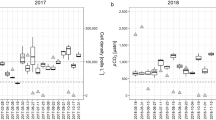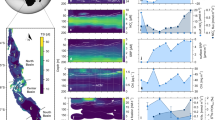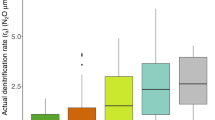Abstract
TROPICAL lakes have been little studied although they often seem to be very productive, especially at those trophic levels exploitable by man. One such lake, Lake George (0°, 00′, 29° 55′ E) is a shallow lake (z̄ = 2.5 m) with an area of approximately 290 km2 including the associated channel, and is one of the smaller lakes in the western arm of the Rift Valley of Africa. An important feature of the lake is the high phytoplankton standing crop of approximately 400 mg of chlorophyll a m−2. Yet, in spite of this, there is very little inorganic nitrogen in the water. There is little seasonal variation in species composition, in the numbers of the phytoplankton and in chemical and physical parameters1,2.
This is a preview of subscription content, access via your institution
Access options
Subscribe to this journal
Receive 51 print issues and online access
$199.00 per year
only $3.90 per issue
Buy this article
- Purchase on Springer Link
- Instant access to full article PDF
Prices may be subject to local taxes which are calculated during checkout
Similar content being viewed by others
References
Ganf, G. G., thesis, Univ. Lancaster (1969).
Viner, A. B., Verh. Intern. Verein. Limnol., 17, 289 (1969).
Viner, A. B., in Bioenergetics and Tropical Ecosystems (IBP/UNESCO regional symposium) (in the press).
Neess, J. C., Dugdale, R. C., Dugdale, V. A., and Goering, J. J., Limnol. Oceanog., 7, 163 (1962).
Fogg, G. E., and Horne, A. J., in Chemical Environment in the Aquatic Habitat (edit. by Golterman, H. I., and Clymo, R. C.), 115 (Noord-Hollandsche Uitgevers Maatschappij, Amsterdam, 1967).
Stewart, W. D. P., Fitzgerald, G. P., and Burris, R. H., Proc. US Nat. Acad. Sci., 58, 2081 (1967).
Hardy, R. W. P., Holsten, R. D., Jackson, E. K., and Burns, R. C., Plant Physiol., 43, 1185 (1968).
Horne, A. J., thesis, Univ. of Dundee (1969).
Horne, A. J., and Fogg, G. E., Proc. Roy. Soc., B, 175, 351 (1970).
Dugdale, R. C., and Dugdale, V. A., Limnol. Oceanog., 7, 170 (1962).
Goering, J. J., and Neess, J. C., Limnol. Oceanog., 9, 530 (1964).
Billaud, V. A., J. Fish. Res. Board Canada, 25, 2101 (1968).
Stewart, W. D. P., Haystead, A., and Pearson, H. W., Nature, 224, 226 (1969).
Stewart, W. D. P., and Lex, M., Arch. Microbiol., 73, 250 (1970).
Horne, A. J., Brit. Phycol. J. (in the press).
Brezonik, P. L., and Keirn, M. A., Abst. Thirty-third Ann. Meeting Limnol. Oceanog. Soc. (Kingston, Rhode Island, 1970).
Howard, D. L., Frea, J. I., Pfister, R. M., and Dugan, P. R., Science, 169, 61 (1970).
Viner, A. B., thesis, Univ. London (1970).
Kusnezow, S. I., Die Rolle der Mikroorganismen im Stoff-kreislauf der Seen (Berlin, 1959).
Field, C. R., thesis, Univ. Cambridge (1968).
Author information
Authors and Affiliations
Rights and permissions
About this article
Cite this article
HORNE, A., VINER, A. Nitrogen Fixation and its Significance in Tropical Lake George, Uganda. Nature 232, 417–418 (1971). https://doi.org/10.1038/232417a0
Received:
Revised:
Issue Date:
DOI: https://doi.org/10.1038/232417a0
This article is cited by
-
Pelagic cyanobacterial nitrogen fixation in lakes and ponds of different latitudinal zones
Aquatic Sciences (2022)
-
Retention of nitrogen, phosphorus and silicon in a large semi-arid riverine lake system
Biogeochemistry (2010)
-
Hydrochemical fluctuations and crustacean community composition in an ephemeral saline lake (Sua Pan, Makgadikgadi Botswana)
Hydrobiologia (2008)
-
Seasonal variation of phytoplankton community in Thale Sap Songkhla, a lagoonal lake in southern Thailand
Netherlands Journal of Aquatic Ecology (1997)
-
Nitrogen fixation by the benthic freshwater cyanobacterium Lyngbya wollei
Hydrobiologia (1992)
Comments
By submitting a comment you agree to abide by our Terms and Community Guidelines. If you find something abusive or that does not comply with our terms or guidelines please flag it as inappropriate.



